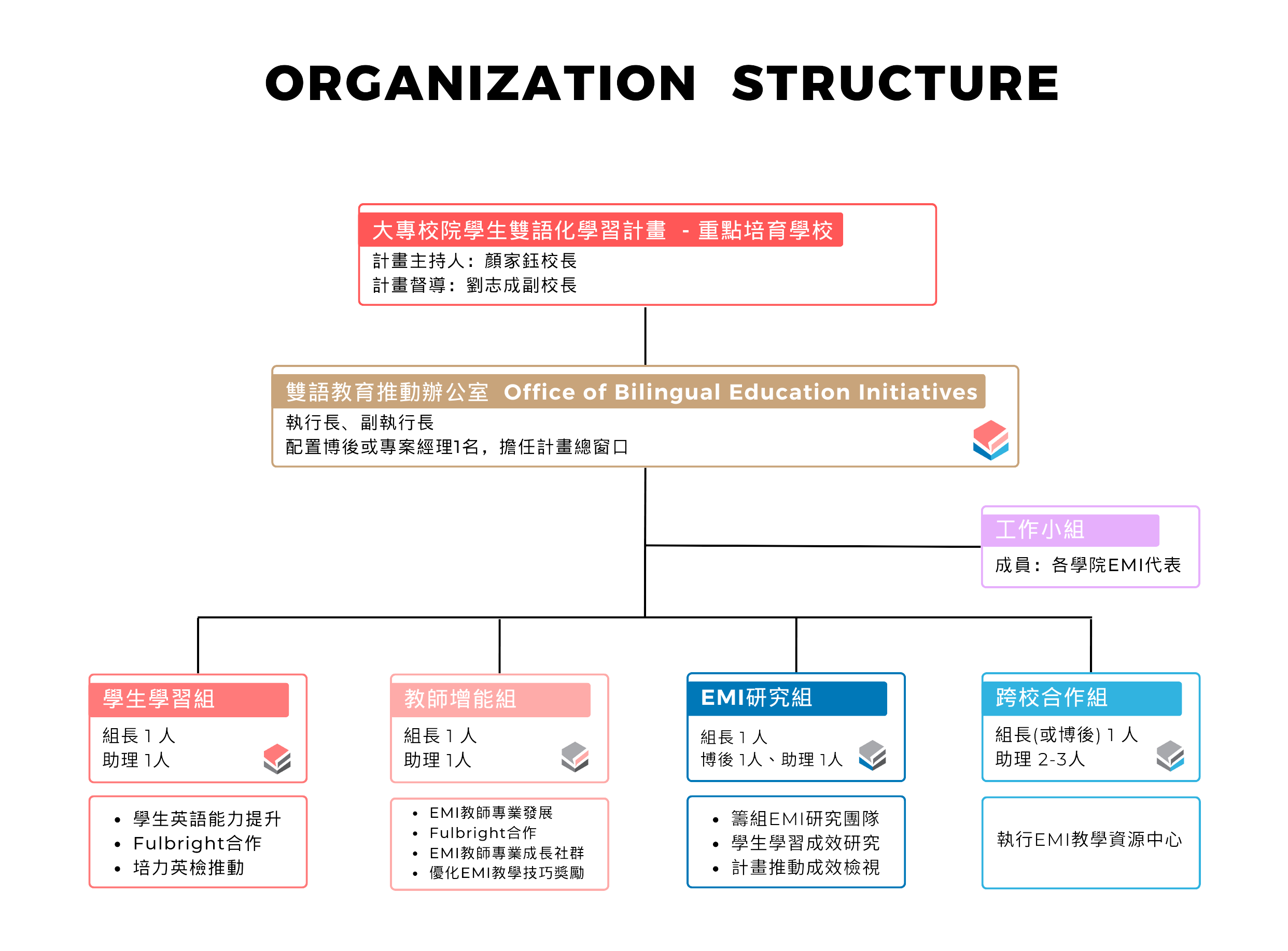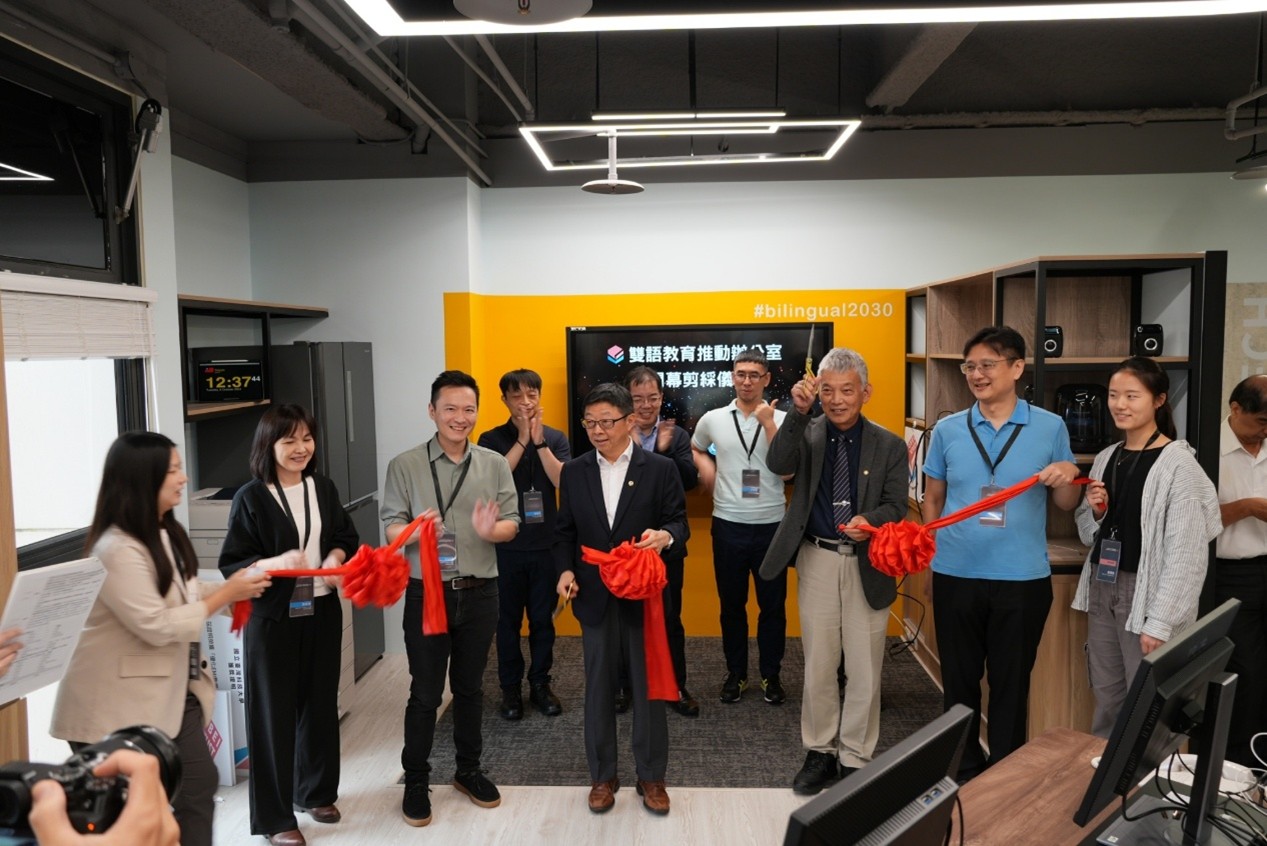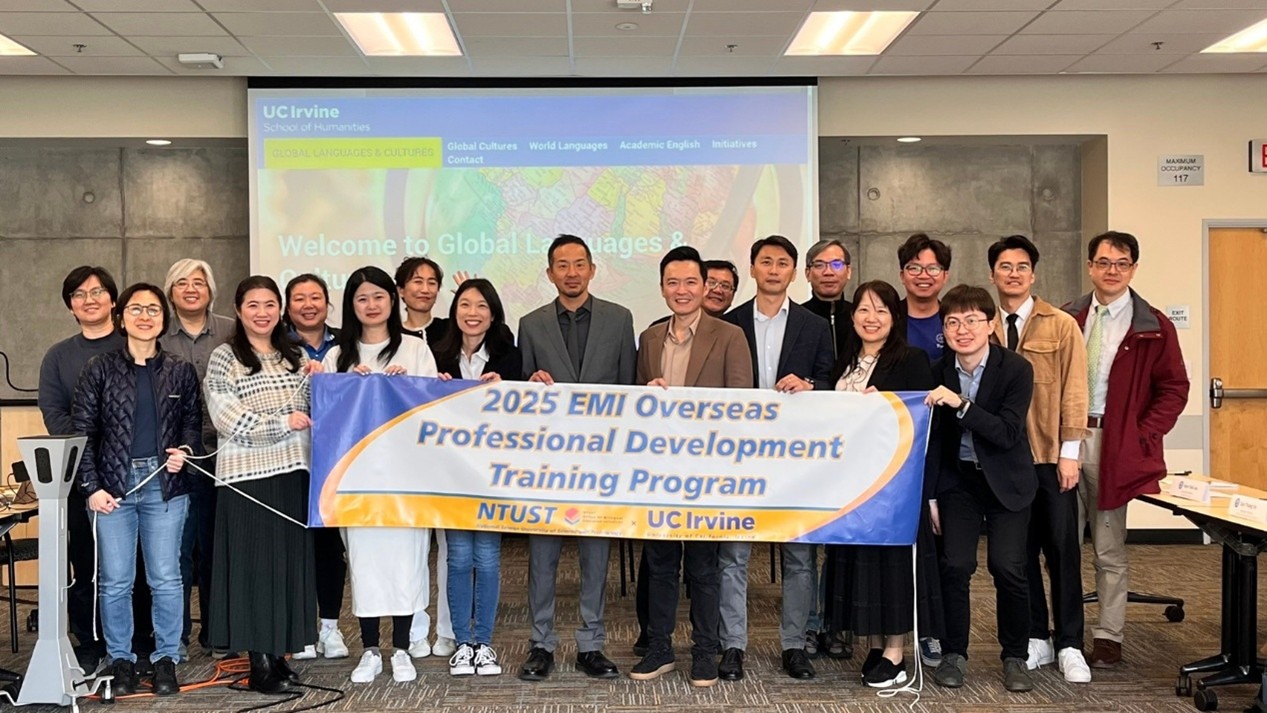I.The origin
In alignment with the "2030 Bilingual Nation Policy Development Blueprint," the
Ministry of Education (MOE) has initiated the Bilingual Education for Students
in College program (BEST program) since September 2021. In light of this
program, three colleges from NTUST were selected as the Key Cultivation Colleges
in the first phase (2021-2022 academic year), and NTUST was designated as the
Key Cultivation University in the second phase (2023-2025 academic year). In
accordance with the requirements of the BEST program and the need for
university-wide promotion, the university-level office "Office of Bilingual
Education Initiatives" (OBEI) was established to coordinate related tasks.
II.The tasks
III.Organization
The president of NTUST serves as the program leader and appoints one vice
president as the supervisor. The OBEI includes an executive director and a
deputy executive director. Under the OBEI is an EMI working group which is
formed by the representatives from each college and relevant departments. The
OBEI is organized into several groups that include the Student Learning Group,
EMI Research Group, Professional Development Group, and Inter-school
Collaboration Group. Each group has one group leader and several assistants or a
postdoctoral researcher. The organizational structure is as follows: (Attach
diagram here)

IV.Expected Outcomes
National Taiwan University of Science and Technology (NTUST) is dedicated to
advancing bilingual education, with a focus on "enhancing students’ English
proficiency," "promoting EMI courses and faculty development," and "fostering
inter-school resource sharing" as its core foundations. Through diverse and
innovative initiatives, the university is steadily working toward its goal of
internationalized education. By integrating curriculum design, teacher training,
and research practices, NTUST has achieved outstanding results, creating a
comprehensive English learning and teaching environment for both students and
faculty. The features and highlights of our bilingual program development are as
outlined below:
(1) Features
NTUST demonstrates a multifaceted approach to development, centered on six key
areas: "enhancing students’ English proficiency," "supporting students in
transitioning to EMI courses," "promoting EMI teacher training," "enhancing EMI
teaching quality," "facilitating inter-school EMI resource sharing," and
"implementing EMI research." These efforts collectively drive the comprehensive
advancement of bilingual education. To begin with, the university employs a
three-tiered modular teaching approach based on students’ English proficiency
levels—categorized as "basic," "intermediate," and "advanced." This approach is
coupled with innovative teaching methods, such as AI-assisted speaking practice
and the "Speaking and Writing Enhancement Program (SWEP)," which prioritize
strengthening English speaking and writing skills. Additional practice resources
are provided to support sustained self-directed learning outside the classroom.
All these measures and resources are aligned with teacher-designed curricula to
elevate students’ speaking and writing abilities to the CEFR B2 level.
Additionally, for first-year students, NTUST offers an "EMI Academic English
Preparatory Course" that leverages both "synchronous" and "asynchronous"
learning modes, preparing students for a smooth transition into EMI courses. To
build a skilled EMI teaching workforce, the university encourages faculty to
participate in off-site training, inter-school exchanges, and the establishment
of teacher communities. Lastly, NTUST promotes inter-school resource sharing by
creating collaborative platforms that offer teacher training courses, TA
training, and cross-campus activities, thereby advancing bilingual education
across higher education institutions.
(2) Highlights of Achievements
Through extensive efforts, NTUST has achieved the following significant
achievements in its bilingual education program:
Enhancing Students’ English and Academic Skills
In terms of English proficiency, students have progressively reached the CEFR B2
level and demonstrated effective speaking and writing skills in courses such as
"Global English Communication" and various "Professional Academic English"
programs. As of 2024, the Language Center has successfully conducted its fourth
annual summer "EMI Academic English Preparatory Course," engaging a total of 847
students from various colleges. This initiative has significantly improved their
academic English abilities and facilitated their success in EMI courses.
Teacher Off-Site Training and Innovative Teaching Techniques
NTUST has launched its off-site EMI training program for teaching teams, leading
36 faculty members to the University of California, Irvine (UCI), University of
California, San Diego (UCSD), and Nanyang Technological University (NTU) in
Singapore for learning and exchange opportunities. At UCI, the training focused
on classroom observations across multiple disciplines (e.g., engineering,
business, medical engineering, and chemistry), complemented by workshops on
teaching skills to foster collaboration between the two institutions. At UCSD,
faculty participated in specialized lectures on teaching methodologies and
curriculum design, engaging in in-depth academic exchanges. Meanwhile, at NTU,
the team attended an international STEM education seminar, sharing insights on
bilingual education while gaining knowledge of the latest educational trends and
practices. Additionally, NTUST has introduced the "EMI Teaching Technique
Enhancement Award Program" to encourage faculty innovation in teaching methods,
curriculum design, material development, assessment strategies, and classroom
environments, ultimately boosting student learning outcomes. Following reviews
by internal and external experts, a total of 21 outstanding cases have been
recognized over the past two years, showcasing significant achievements and
inspiring further pedagogical creativity.
Internationally Published and Practically Applied EMI Research Outcomes
To gain deeper insights into the effectiveness of EMI teaching, NTUST's Office
of Bilingual Education Initiatives (OBEI) has established a dedicated EMI
Research Team. T his team is committed to enhancing the visibility of bilingual
education outcomes both domestically and internationally, as well as making
research findings tangible by actively participating in or organizing
international academic exchange events. In the 112 academic year (mid 2024), the
research team completed 4 EMI-related research projects, and by the 113th
academic year (2025), this number had increased to 6 ongoing projects. These 6
studies were officially presented at the 2025 NTUST Bilingual Education Research
Showcase. Besides on-campus research and presentation events, the NTUST
bilingual education research team has also actively engaged in other significant
academic events. Through these efforts, the OBEI not only continues to elevate
its standards of bilingual education research within the university but also
makes substantial contributions to Taiwan’s influence in the international
academic community.
Inter-School Collaboration and Resource Sharing for Bilingual Education
NTUST actively promotes EMI strategy alliances by signing cooperation agreements
with multiple technical and vocational institutions. These agreements cover
areas such as EMI course resource sharing, teacher professional development,
administrative staff training, co-hosting forums, and collaborative teaching
practice research, fostering mutual learning and resource integration. Quotas
for summer preparatory courses and TA training programs are reserved for
students from partner schools. Additionally, in collaboration with The
Foundation for Scholarly Exchange (Fulbright Taiwan), NTUST dispatches teaching
support teams to deliver lectures on English and multicultural topics, enhancing
English proficiency and global perspectives. Meanwhile, the university is
expanding international partnerships by signing an EMI teacher training
memorandum with the University of California, Irvine, a dual-degree memorandum
with the University of Bristol in the UK, and participating in a collaboration
between Saxony and TSMC (Taiwan Semiconductor Manufacturing Company) to arrange
student internships. These initiatives are dedicated to cultivating talent with
both an international outlook and professional expertise.

Photo 1: Ribbon-cutting ceremony for the opening of the Office of Bilingual Education Initiatives

Photo 2: Group photo from the first collaboration between NTUST and UCI for the "2025 NTUST x UCI EMI Overseas Professional Development Training Program" and the signing of the MOU